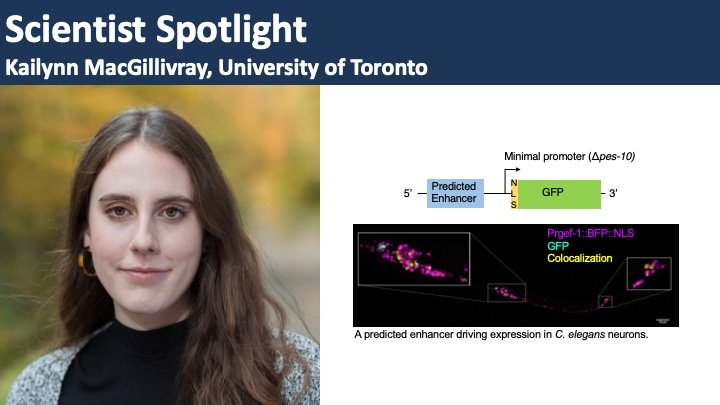Kailynn MacGillivray is originally from Kemptville, Ontario and is carrying out her PhD in the lab of Arneet Saltzman studying histone modification writers in C. elegans.
Where are you from? What do you miss about your hometown/country?
I’m from Kemptville, Ontario, a small town outside of Ottawa. What I miss most is my family and the peacefulness of a small town. I also miss being able to see the stars at night!
What city do you currently live in and what do you like most about this city?
I currently live in Toronto, Ontario. I love how busy the city is. There is always a new restaurant to try, a concert to go to, or an event to check out!
What are some ways you detach from work/science/academia? Do you have a favourite example of this?
Outside of the lab I love to read, particularly murder mysteries. I also like boxing and playing tennis with friends in the summer.
Do you have any special talents outside of research that few people in your academic life know about?
I am a pretty good cook. I love to experiment with different elements of cooking, like trying to use different types of salt, spices, or acids. I can be very creative in the kitchen, and most of the time it pays off!
Do you have a recommendation for a book, tv show, movie or documentary?
The Woman in the Window by A.J. Finn is a great book with an unreliable narrator. If you like Gone Girl or The Girl on the Train, you will love this book!
What made you decide to become a researcher?
I have loved science since I was a little kid and I have always been a curious person. When I got the opportunity to do a research project during my undergraduate degree, I liked that this curiosity was encouraged and the fact that I got to be the one to find the answers to my questions.
If you wouldn’t be a researcher, what would you like to be/think you would be?
I think that I would have gone to teacher’s college. Working as a teaching assistant during my graduate degree has shown me how much I love to share my knowledge with others!
What sparked your interest in epigenetics?
The concept of a histone code. It fascinates me how different histone modifications can interact and influence each other to regulate thousands of genes and 3D chromatin architecture.
If you could give your “first-year-PhD-self” one advice, what would it be?
To be productive you need physical, mental and emotional rest. It is better to take a break and come back with a fresh set of eyes than to try and push through a problem. Also, join your department’s graduate student union. It’s a great way to get to know people in other labs!
Where would you like to see your research/field of interest end up in the future?
I would like to see improved communication of epigenetics to the general public. I think that it is such a cool field of study with new tools and applications emerging all the time, and it should be understandable and accessible to everyone.

